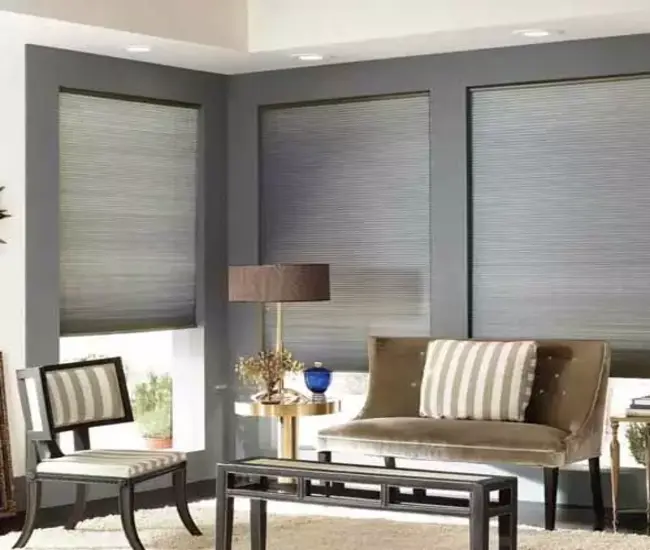Wondering which option out of light filtering, room darkening, and blackout shades is best in terms of light filtering ability, privacy, see-through, insulation, and noise cancellation? Light filtering blinds block out less than 95% of natural light; room darkening shades block out 95% to 99% of sunlight; while blackout shades block out nearly 100% of external light.
Put in another way, blackout shades block all light, room darkening shades block most (but not all) light, and light filtering shades let in enough filtered light while maintaining privacy.
This post covers the characteristics and pros and cons of these three types of shades, so you can choose the best one for your home.
With a tighter weave and thicker fabric, blackout shades are the best option for providing privacy, keeping heat and cold out, and reducing noise levels in your room. Blackout shades are better than both light filtering and room darkening shades for your bedroom, as they block out total light, making your space a little easier to sleep in.
Room darkening shades darken the room by blocking more incoming light and provide better privacy than light filtering shades. So, if you want to block out most, but not all, of the light that pours into your room, room darkening shades are the way to go. They can kill glare, making your TV watching experience better.
If you need a perfect balance between light control and privacy in spaces like living rooms, select light filtering fabrics.
Scroll on to learn a detailed comparison of these three types of window treatments, while highlighting their differences and pros and cons, price ranges, and size options.
What is the Difference between Light Filtering vs Room Darkening vs Blackout Shades?
Light filtering, room darkening, and blackout shades are three popular window treatments that offer different levels of light control, privacy, and cold and heat blocking in your home.
Light Filtering Shades for Natural Light and Privacy
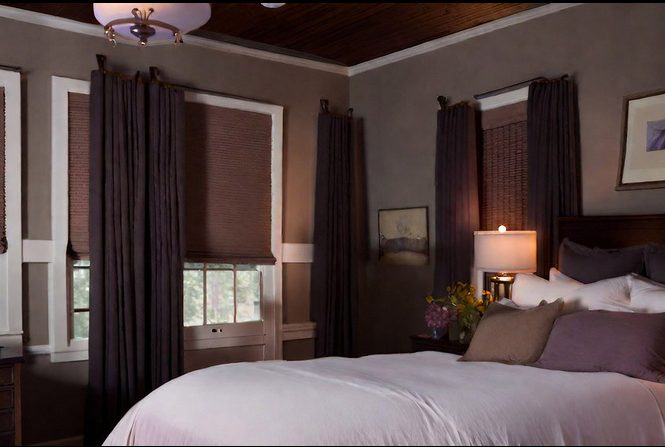
Light filtering shades are typically made of sheer or semi-sheer fabric materials that allow 6% to 14% light (depending on openness percentage) to pass through, while also providing a moderate level of privacy. They are a great option for areas like living rooms and outdoor spaces where you want natural light to sail in but still want some level of privacy.
Room Darkening Shades to Block out Most, But Not All, of Light
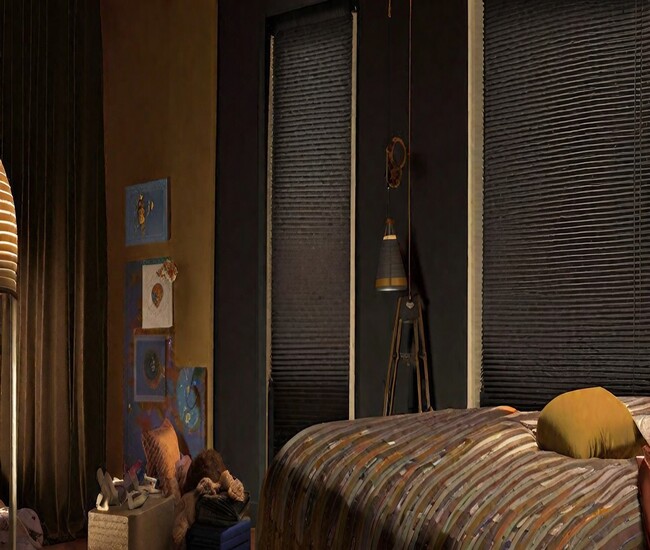
Room darkening shades are made of heavier materials with tighter weaves, which block out more light than light-filtering shades, but they still allow 1% to 5% of light to enter your room. These window coverings are an excellent choice for bedrooms, nurseries, or any other room where you want to reduce the amount of light coming in, but don’t necessarily need complete darkness.
Blackout Shades for Total, 100% Light Control & View
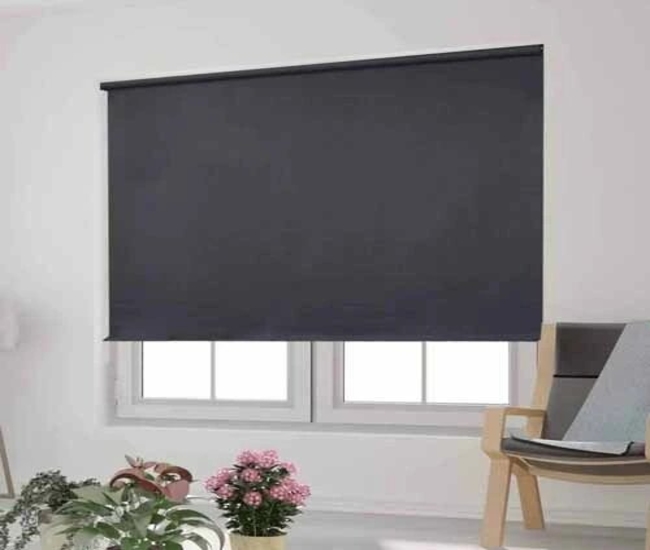
Blackout shades, as the very name suggests, are designed to block out all 100% or nearly 100% sunlight. They are usually made of thicker, opaque fabrics with the tightest weave, which do not allow any light to pass through. These blinds are the best choice for bedrooms, media rooms, home theaters, or any other room where you want complete darkness and maximum privacy.
In short, light-filtering shades allow some light to pass through and provide some privacy. Room-darkening shades darken the room by blocking more incoming light than light filtering shades and provide more enhanced privacy. Blackout shades for windows completely block out light.
What Are the Pros and Cons of Light Filtering Shades?
Light filtering shades have lots of advantages, such as illuminating your room’s interior, resisting damage from UV rays, and providing privacy. At the same time, they do have some disadvantages, for example, they are not a good choice for bedrooms and kids’ rooms.
Here are some of the pros and cons of light-filtering shades for windows.
Pros
- Allow natural light to enter your room.
- Provide some privacy in your home.
- Allow a view of the outside.
- Can be used on windows in any room, including living rooms, dining rooms, and kitchens.
- Can be less expensive than room darkening or blackout window coverings.
Cons
- May not provide enough privacy if openness is more than 5% and your room is well-lit at night.
- May not block out enough sunlight for your rooms that receive a lot of direct sunlight.
- May not be the perfect choice for bedrooms, nurseries, or other rooms where complete darkness is desired.
Average Price Range and Sizes
A sheer light filtering shade will typically cost between $72 and $350 for window sizes ranging from 12” (1 ft) W x 12” (1 ft) H to 96” (8 ft) W x 96” (8 ft) H.
Pros and Cons of Room Darkening Shades
Like light-filtering window treatments, room-darkening shades do have some advantages and disadvantages, such as:
Pros
- Darken the room by blocking out more than 95% light.
- Provide better privacy and heat control than light filtering shades.
- Can be used in bedrooms, kids’ rooms, or other spaces where you need sufficient darkness.
- Can be less expensive than blackout window shades.
Cons
- May not completely block out all incoming light, allowing 1% to 5% of it to sail in.
- They are not suitable for rooms where complete darkness is required.
- They are not a good option for people who are sensitive to light.
Average Price Range and Sizes
A room darkening sheer zebra shade typically costs between $76 and $366 for window sizes ranging from 12” (1 ft) W x 12” (1 ft) H to 96” (8 ft) W x 96” (8 ft) H.
Pros and Cons of Blackout Shades
Blackout shares are the right window treatments for creating cozy and comfortable spaces for a restful sleep.
Pros
- Completely block out all light and most heat entering your room.
- Provide maximum privacy in your room.
- Ensure a noise free environment.
- You can use them in any room where complete darkness is desired.
- Can improve energy efficiency by keeping out sunlight and reducing the need for air conditioning.
Cons
- Can be more expensive than light filtering or room-darkening options.
- May not provide a view of the outside.
- May be too dark for some people when lowered, especially during the day.
- May not be suitable for rooms where some natural light is required, such as your living rooms or kitchens.
- Overall, the choice between light filtering, room darkening, and blackout shades for windows will depend on your unique requirements for light control, privacy, and noise reduction.
Average Price Range and Sizes
The typical price range for a blackout roller shades is $82 to $400 for window sizes ranging from 15” (1 ft) W x 24” (1 ft) H to 96” (8 ft) W x 96” (8 ft) H.
How to Install Light-Filtering, Room Darkening & Blackout Shades for Perfect Fit & Function
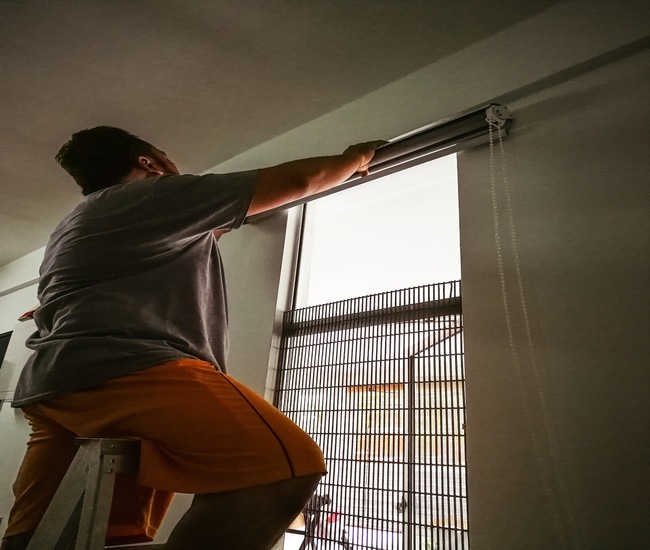
Installation of light filtering, room darkening, and blackout shades follow the same procedure. You will need to follow these DIY steps:
- Accurately measure your windows to the fraction of an inch.Start by measuring the width and height (w x h) of your window frame to the 1/8th of an inch. If you want to mount them inside the frame, make sure to measure the window depth.
- Order shades as per measured values.
- Install the mounting brackets
- Attach light filtering, room darkening, or blackout shades to the brackets.
- Test the shade operation by pulling it up and down to make sure it works correctly.
- Finish the installation by securing any cords or cordless lift systems and adjusting the shade to the desired height.
By following these steps, you can properly install your light-filtering, room-darkening, or blackout shades for the perfect fit, maximum functionality, and curb appeal.
How to Keep Light-filtering, Room-Darkening, & Blackout Shades Working Their Best
Proper maintenance will add to the life of light-filtering, room-darkening, and blackout shades and keep them looking like new for a long time. Here are some DIY tips:
- Regularly dust the fabric, at least once a week.
- Wash your blinds, if needed.
- Make sure the mounting brackets, tracks, or other supports are firmly secured so there won’t be any shifting over time.
- Regularly inspect your light filtering, room-darkening, and blackout shades for signs of wear or damage, such as tears or fraying fabric.
How to Make Light Filtering, Room Darkening, and Blackout Shades Safe for Kids & Pets
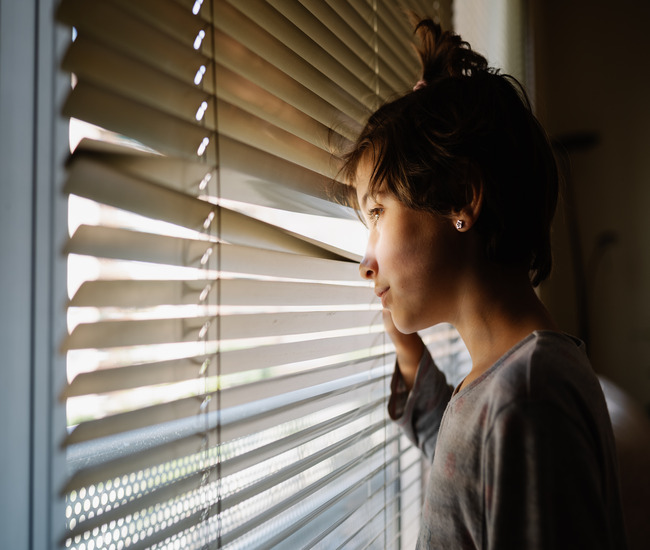
All 3 types of shades – light-filtering, room-darkening, and blackout – come with various child-safe options:
These lift systems do not have any dangling cords, so they are safe for homes with young children and pets.
Where to Buy Light Filtering, Room Darkening, and Blackout Shades

Whether you buy light filtering shades , room darkening shades, or blackout shades at Affordableblinds.com, you’ll get:
- Up to 70% discounts
- Free Shipping throughout the contiguous United States at no cost to you
- 110% best price guarantee.
- 100% Worry-Free Fit: We’ll take up part of the cost to get your problem resolved, if you mismeasure your window.
- A Free Lifetime Guarantee
- 100% Satisfaction Guarantee with 5-star customer care
- Free Consultancy (Measuring, Installing, Choosing Right Product)
FAQs
What is the difference between light filtering and blackout shades?
Light filtering and blackout shades differ in their level of light control. Blackout shades block out 100% of light, while light filtering shades let in a little light to give diffused natural daylight, like translucent dimming. Blackout materials completely cut glare, so they’re ideal for media rooms. On the other hand, light filtering shades are a great choice for living rooms, dining rooms, and classrooms.
Structurally, blackout shades are made from denser, solid colored fabrics, while light filtering shades are constructed from lighter woven materials.
Do blackout shades insulate better than light filtering?
Yes! Shades featuring blackout fabrics are more effective in insulating heat and cold than light filtering shades, keeping your space warmer in the winter and cooler in the summer.
Is blackout better than room darkening?
If you want 100% light control or complete darkness in your room, blackout curtains are much better than room darkening ones. However, if you only need to block out a significant amount of light, room darkening curtains are the way to go. If you are looking for better privacy and security, total blackout will be a better option.
Can people see inside with light filtering shades?
The answer is, thankfully, no! Light filtering shades are not see-through at night. Onlookers can only make out diffuse shadows of figures crossing the room.
Do light filtering shades block heat?
Yes, light filtering shades can decrease the intensity of UV rays and diffuse the light, which can block incoming heat. However, they do not provide the same level of insulation as blackout shades or thermal curtains.
Do room darkening shades keep heat out?
Yes, room darkening shades can block out sunlight to prevent your rooms from getting uncomfortable and warm due to heat gain. By maintaining a comfortable temperature in your room, they can decrease your dependence on HVAC systems and reduce your energy consumption, significantly cutting down on your monthly utility costs.
Are light filtering shades good for privacy?
Light filtering shades are good for privacy for your home at night. They came in lots of styles, fabrics, and opacity levels, so you can choose a design that works best for your home’s light filtering and privacy needs.
Do light filtering curtains provide privacy at night?
Yes, light filtering curtains do provide privacy at night. Light filtering fabrics provide a perfect balance of privacy and natural light. They offer a lot of glare-free light and a view of the outdoor surroundings, while providing moderate levels of privacy. To increase privacy at night, you can layer curtains with blinds, shades, or drapes.
What is the downside to blackout curtains?
While blackout curtains effectively block external light and noise for a restful sleep, they do have some disadvantages. One downside to blackout curtains is that they can make your room too dark or hot, potentially disrupting your sleep schedule. Additionally, blackout window coverings can be expensive and a bit difficult to clean, as they are made of a thicker, heavier material.
Need More Help?
Still unsure which opacity level of shades will best serve your needs? Contact our professionals using 24/7 live chat or give us a ring at (800) 863-6109 for expert advice and a custom solution.
